
To tell the truth: What current and hopeful federal employees should know about polygraphs
Federal security clearances may grab headlines, but the polygraph portion has gone virtually unchanged for decades. Now they're getting a closer look.
An ever-present backlog of federal security clearances continues to grab attention from lawmakers and leadership. But one component of those clearances — polygraph exams —is getting a closer look, as well.
In April, U.S. Customs and Border Protection, a major utilizer of polygraphs, told the House Homeland Security Subcommittee on Border and Maritime Security it was evaluating the results of a six-month alternative polygraph pilot for screening new hires. And this fall, the Intelligence Advanced Research Projects Activity (IARPA) within the Office of the Director of National Intelligence will launch a competition to find new standards for assessing credibility.
Alexis Jeannotte, program manager for the Credibility Assessment Standardized Evaluation (CASE) Challenge, said the goal was to create a “ruler” against which to measure the efficacy of techniques, including the polygraph. IARPA wrote in its announcement of the CASE Challenge that the polygraph has not undergone significant changes in nearly 50 years.
“We need these protocols to evaluate how good these technologies are,” she said.
IARPA hopes that the winning submissions can get government, academics and industry on the same page when evaluating the questions or technology used to judge a person’s credibility.
Why do agencies use polygraphs?
Agencies may require polygraph exams for applicants to positions with certain levels of security clearance, or to renew security clearances. Most agencies who administer them are within the Defense Department and Intelligence Community.
Law enforcement, courts, the scientific community and the IC debate the reliability of polygraphs for gaining truthful answers. But due to several high-profile national security incidents such as Edward Snowden’s leaks of National Security Agency intelligence in 2013, agencies are under pressure to demonstrate they have taken all measures to weed out internal threats from employees and contractors with access to sensitive information.
As such, agencies have been moving toward continuous evaluation and more polygraphs. But the Office of the Director of National Intelligence leaves it to individual agencies to determine the need for polygraph exams.
In addition, not all agencies will share polygraph results, possibly requiring an existing fed to take another test for a position in a different agency, said Derrick Dortch, director of Career Services at the Institute of World Politics. One question he said to expect was for examiners to ask candidates whether they had visited or heard of the website AntiPolygraph.org, which claims to offer advice for outsmarting the polygraph exam.
What questions are on the polygraph?
Throughout its history, the federal polygraph exam’s questions have barely changed, said William Henderson, co-founder of Federal Clearance Assistance Service LLC. One exception was the addition of questions about disclosing classified information to media or other unauthorized recipients.
 The Federal Psychophysiological Detection of Deception Examiner Handbook, which outlines exam questions into several types including “relevant,” “primary relevant,” “secondary relevant,” “comparison” and “overall truth” — the last of which intended to elicit a physiological response.
The Federal Psychophysiological Detection of Deception Examiner Handbook, which outlines exam questions into several types including “relevant,” “primary relevant,” “secondary relevant,” “comparison” and “overall truth” — the last of which intended to elicit a physiological response.
The handbook says relevant questions should be clear and concise, free of legal terms, answerable with “yes or no,” and not be worded in the form of an accusation or infer knowledge or guilt.
Irrelevant screening questions are described as those to orientate a respondent before a relevant question is asked, but should still be neutral and not evocative of emotion, according to the handbook. Unlike private employers, federal examiners can also ask about examinees’ personal lives, religious and political beliefs, sexual behaviors or labor union activities.
But Dortch, a career expert in intelligence and national security as well as the host of Federal News Radio’s Fed Access, said that exact questions vary by agency. For example, he said, a law enforcement agency such as the FBI will be more concerned with questions related to a job candidate’s criminal background, while the CIA will likely ask more about foreign contacts.
“No one should expect every polygraph to be the same,” he said.
What training do polygraph examiners have?
Academic and industry experts have said examiners do affect polygraph results, based on their phrasing of questions, interpretation of responses and machine readings. Nevertheless, training for federal polygraph examiners is not standardized across agencies.
But according to the Intelligence Community Policy Guidance 704.6, issued in 2015, all examiners are expected to have the National Center for Credibility Assessment, renamed from the Defense Academy for Credibility Assessment in 2010, which originated as the Army Polygraph School in 1951. Additional training can also change by agency.
CBP, for example, requires NCCA certification for in-house examiners as well as for contracting examiners, according to job listings found on USAJobs.gov and the American Polygraph Association.
Other possible training may occur at the U.S. Military Police School/Army Polygraph School and the Department of Defense Polygraph Institute, and the Psychophysiological Detection of Deception program, among others.
What about the debate around polygraphs’ accuracy?
In 2003, a National Academies committee to review the scientific evidence on polygraph exams authored a report saying the scientific evidence for polygraphs as an employment screening method was relatively low and that fairly basic countermeasures could undermine the results. The report also said that reasons for a lack of research into the use of polygraphs by the federal government were “structural,” meaning that the national security and law enforcement agencies who administer the exams “do not operate in a culture of science to meet their needs for detecting deception,” and were committed to using them.
 This and the fact that many courts will not allow polygraph results submitted as evidence in criminal proceedings are among the reasons Sean Bigley, a frequent writer on the subject for ClearanceJobs.com, said he was unsure why exactly agencies still embrace the practice.
This and the fact that many courts will not allow polygraph results submitted as evidence in criminal proceedings are among the reasons Sean Bigley, a frequent writer on the subject for ClearanceJobs.com, said he was unsure why exactly agencies still embrace the practice.
“The general consensus seems to be that [it’s] an effective scare tactic,” Bigley said. “It gets people to cough up details about their lives that they wouldn’t otherwise do.”
He also said the examiners’ training and the way in which they phrase questions can yield wildly different results from respondents.
IARPA’s Jeannotte said some deep government-sponsored research into the practice includes the 2003 National Academies study, as well as a 2006 report on polygraph exams at the Department of Justice, in which the Office of the Inspector General did not make recommendations on the practice. She said she was not aware of any systematic evaluations of polygraphs by ODNI.
“Everybody has been moving toward it in last 20 years,” Dortch said. “It’s not a fail-safe tool.”
The American Polygraph Association describes polygraphs as highly accurate but not infallible. The organization offers remedies for both examiners and examinees in the case of false positives or negatives due to human error.
“However, since the same physiological measures are recorded and the same basic physiological principles may apply in both event-specific and screening examinations, there is little reason to believe that such testing is of no value in screening situations as some opponents claim,” the organization writes on its website.
Can the test results be used against you?
The SF-86 form submitted by clearance seekers says they may not be prosecuted for admitting on the form to illegal drug use within the last seven years. It also says that answers given by current federal employees may not be used as evidence in subsequent criminal proceedings.
However, the late attorney Bill Bransford, of federal employment law firm Shaw, Bransford and Roth told Federal News Radio in 2012 that although polygraph answers in the federal employment process are not supposed to be used against you, if you confess to a crime the examiner may have cause to report it, should other evidence support this claim.
The SF-86 form also outlines how OPM may disclose answers to IC agencies for national security reasons, and in court proceedings when the federal government is a party.
What if you fail the test?
If you fail the exam you are permitted to appeal the results, which Dortch said he always recommends. But a Freedom of Information Act request is usually needed to see the results. Those who refuse to take the exam may not be able to proceed with the application process.
Henderson said his biggest concern with the polygraph is when examinees are accused of using countermeasures to beat the test.
“’Countermeasures’ is really a subjective variant,” he said. “There’s no agreement among examiners as what actually constitutes countermeasures.”
Until June 2017, nothing prohibited agencies from taking action against examinees for solely failing a polygraph. But now, examiners must gather further evidence to justifying denying a security clearance for taking other action, according to ODNI’s updated Security Executive Agent Directive 4.
If a current federal employee fails the test, Henderson said, they will likely be placed on administrative leave until a determination can be made.
Copyright © 2024 Federal News Network. All rights reserved. This website is not intended for users located within the European Economic Area.
Amelia Brust is a digital editor at Federal News Network.
Follow @abrustWFED





